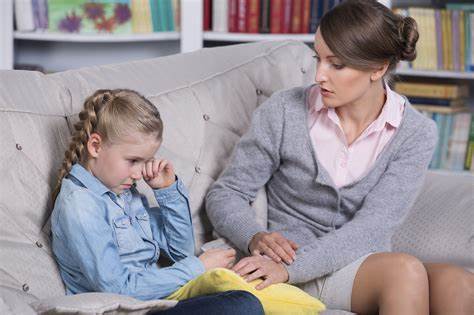
Over the past few years, we’ve seen an increase in mental health problems among our children and adolescents. In the last two years, we’ve experienced a global pandemic, an increase in political and social unrest in our country, economic problems, and now worldwide conflicts. With this increase in problems that are hitting very close to home, many people are developing mental health problems. Our children are no exception to this. Many polls have shown an increase in self harming behaviors, depression, and anxiety in children and adolescents. With this increase in problems and unhealthy behaviors, many parents are seeking out mental health services for their children. But many parents tend to not know when they need to actually take their children to a therapist. Here are some indicators that your child may need to see a mental health professional.
1. Your child is exhibiting self harming behaviors such as cutting, burning, biting, or even hitting themselves. Self harming behaviors are often used to distract the person from deeper emotional pain or to help the person feel something at all due to feeling numb. The danger of self harming behaviors is the risk of the person going too far and injuring themselves in a life threatening way. Therapy is necessary in order to address the emotional pain as well as the behaviors.
2. Your child shows extremely low self esteem. A lack of self esteem may seem to be innocuous on the surface, but it can lead to severe problems. Many children who have low self esteem are more likely to exhibit self harming behaviors, suicidal ideation, isolating themselves from friends, and lack of performance in school. Seeking out therapy can help your child with building up confidence to make friends and have faith in their abilities as individuals
3. Your child tends to isolate themselves from others and not interact with others. Many teenagers tend to isolate themselves from time to time to get away from the stress of every day life, but there are times when they isolate themselves to the point when they are not coming out of their room or being around people at all. If your child has this habit of staying in their room and refusing to come out to do regular activities such as going to school, it is time to seek out professional help. Isolation can be a sign of deeper depression or severe anxiety. Therapy is necessary in order to help your child with understanding how to handle the stress of relationships and every day life in addition to building up confidence to step outside and interact with every day life.
4. Your child has rapid changes in mood and has explosive outbursts. Rapid changes in mood and explosive changes in mood can be a sign of a mood disorder and that may require medication to treat effectively. Mood changes and outbursts can also put other family members at risk especially if your child acts aggressively. Therapy can assist your child with impulse control as well as identifying triggers for the mood swings.
5. Your child has become aggressive towards others either verbally or physically. When children act aggressively towards others, it is a sign that something deeper is going on and it they could have problems with feeling sympathy or empathy towards others. If it is reported to you that your child is making serious threats towards others, it’s time to seek out mental health services to help them with impulse control, positive conflict resolution, and anger management.
6. Your child has expressed that they have had thoughts of no longer wanting to be alive. If your child expresses this to you, then it is best to first seek out the help of a mental health hospital to have them evaluated for any serious danger to themselves. After they have been stabilized weekly therapy is necessary to provide extra emotional support, coping strategies, and working out negative thought patterns.
Seeing your child in any serious emotional pain can be difficult for any parent, especially if you are not familiar with any way of helping them through it. Therapy can provide your child with not only emotional and mental support, but it can also provide you as a parent with guidance and tools to help them. While therapy is a powerful tool it cannot replace the most important factor in a child recovering from difficult emotional problems. That tool is a loving and supportive parent that is present and active in that child’s life.
